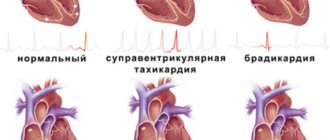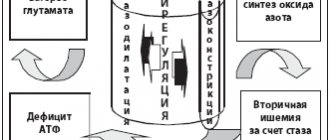What happens during menstruation
During the entire cycle, the body prepares for possible motherhood; the hormone progesterone is intensively produced. If conception does not occur, its quantity decreases sharply, and prostaglandin hormones begin to be produced, which cause the onset of menstruation.
There is a narrowing of the vessels of the endometrium of the uterus, as a result of which its blood supply decreases. The mucous membrane begins to gradually exfoliate and separate from the uterus. Its remains are excreted together with the blood that accumulates due to ruptures of small vessels.
This process does not happen gradually. Some parts of the mucous membrane begin to disintegrate earlier, and some a little later. That is why critical days last from three to five days.
In parallel with the natural removal of exfoliated endometrium, a new layer of it grows. We can say that menstruation is a transitional moment from one cycle to the next.
Menstrual fluid consists of blood and secretions secreted by the glands of the uterus. In addition, it contains vaginal epithelial cells and mucous particles. A woman loses approximately 50 g to 80 g of blood during one menstruation.
On critical days, unpleasant sensations may often occur, such as:
- Pain in the lower abdomen. When visiting a doctor, girls often note that their ovaries hurt during menstruation. But in fact, pain in the lower abdomen is associated with contractions of the uterus during menstruation. Special medications will help eliminate pain.
- Unpleasant odor of menstrual discharge, causing discomfort to women.
- Nausea and fever.
Remember that hygiene is the key to women's health. You need to pay special attention to hygiene on critical days. You should take a shower at least twice a day, change pads every four hours, and wear comfortable underwear made from natural fabrics.
Nausea during menstruation
During menstruation, various hormonal changes occur in the body, as a result of which some unpleasant symptoms appear. For example, nausea during menstruation. Typically, it occurs most often between menstruation and ovulation.
Almost every girl has encountered symptoms of PMS, which, in addition to nausea, include chest pain, swelling, bloating, lower back pain and depression. All these unpleasant symptoms are caused by an imbalance of hormones such as estrogen and progesterone.
If you feel sick during your period, it may be due to increased levels of serotonin in the cerebrospinal fluid. Also, nausea during menstruation can occur due to excess water in the body. In both cases, intracranial pressure changes. And as a result, during this period, in addition to nausea, a woman may also experience dizziness, pale skin, severe depression, and in rare cases, loss of consciousness.
Of course, all representatives of the fair sex experience their periods differently. This largely depends on the structure and location of the uterus. Medical experts note that in some women the uterus is positioned incorrectly, with a slight deviation back. Therefore, it puts a lot of pressure on the nerve centers, which is the reason why pain appears in the lower back, sacrum, lower abdomen and nausea during menstruation. It should be noted that the activity of the uterus also depends on hormonal levels. Therefore, if you feel sick during your period, a possible reason for this could be an imbalance of progesterone and prostaglandins in the body.
If you experience nausea during your period, but this has not happened before, the reason may be pregnancy. Indeed, sometimes expectant mothers may experience spotting during menstruation. Bleeding often occurs during ectopic and frozen pregnancies; in this case, the woman may also have severe abdominal pain and fever. If these symptoms occur, you should immediately go to the hospital. The doctor will prescribe an ultrasound scan for you during your period, and if the examination confirms an ectopic pregnancy, you will need urgent surgery.
Nausea during menstruation can occur if a woman takes birth control pills, as they significantly increase the level of hormones in the body. If hormonal imbalances occur, severe irritability, migraines, and sweating may occur simultaneously with nausea.
It should be noted that nausea and gastrointestinal infections can also be causes of nausea. If you experience severe nausea during your period, do not self-medicate, but seek medical help immediately. Since only a doctor can determine the exact causes of the ailment.
Temperature during menstruation
Some girls experience fever during menstruation. Medical experts say that a slight increase in blood pressure should not be a cause for concern. After all, the female body experiences some stress during menstruation, loses blood and becomes dehydrated. Therefore, many feel weak and lack of appetite. If in the evening the temperature rises a little more than 37 degrees, then most likely this is caused by fatigue. If there is a significant increase in temperature, and in addition severe pain appears, you need to call a doctor. Since high temperature during menstruation may indicate problems in the female genital area. When the hormonal balance is not disturbed, the process of menstruation does not cause severe discomfort.
High fever during menstruation may result from an infection. During menstruation, the uterus opens slightly, making it easier for bacteria to enter. For this reason, many women prefer to use pads rather than tampons. During this period, it is very important to monitor personal hygiene.
Temperature during menstruation may indicate the presence of inflammatory processes in the intestines. After all, women often suffer from diarrhea during this period. And the increase in temperature in this case is the reason for a thorough examination.
Approximately in the middle of the monthly cycle, ovulation occurs, during which a phenomenon such as an increase in temperature is observed quite often. Girls who monitor changes in basal temperature can determine the most suitable moment for conception.
Another reason why pain and high temperature may appear during menstruation is pregnancy. If these symptoms occur, perform a special test, and if the result is positive, consult a doctor to rule out the presence of an ectopic or frozen pregnancy.
The last reason for increased temperature during menstruation is early menopause.
Is dizziness dangerous during menstruation? What are the causes and treatments?
- Dizziness during menstruation is a very common occurrence that does not pose any particular danger, but significantly worsens a woman’s quality of life.
- It is possible to combat this symptom, but this should only be done after consulting a doctor.
- This article discusses in detail the issue of the occurrence of dizziness in women during menstruation.
What not to do during menstruation
In order not to harm your own health, during menstruation it is not recommended:
- exercise vigorously or experience other physical activity. Sports exercises during menstruation should be moderate, only then will they be beneficial: they will help get rid of pain and improve your mood. And excessive exercise can increase bleeding;
- visit swimming pools, baths and saunas. Heat treatments increase blood circulation, and as a result, bleeding may increase. In addition, on critical days, the risk of introducing an infection into the body increases. Therefore, these procedures are best replaced with a shower;
- drinking alcohol. Alcoholic drinks increase blood pressure, which can lead to poor health and increased bleeding;
- eat wrong. Poor nutrition during menstruation can cause nausea, weakness and abdominal pain. On critical days, you need to eat foods that contain magnesium, calcium, and fiber. Porridge, chicken, fish, or mint and chamomile tea are the best diet during menstruation. It is not recommended to consume spicy, sweet, salty, fatty foods during this period;
- have sex without a condom. There is no categorical prohibition on sexual relations during menstrual periods. But the high risk of infection entering the uterus should be taken into account. It is for this reason that during sexual intercourse during this period it is best to use a condom, even if you have a regular partner;
- take certain medications. If you need to take any medications during your period, be sure to consult your doctor about this. It is important to know that drugs made on the basis of acetylsalicylic acid (for example, aspirin) can significantly thin the blood. Thus, taking aspirin during your period will only prolong it. To reduce pain during menstruation, take medications such as ibuprofen and paracetamol;
- carry out any operations. The fact is that during menstruation, blood does not clot well, and as a result, bleeding may occur during surgery;
In addition, during menstruation you should not do perm, lifting, skin tightening, or dye your hair, as due to temporary changes in hormonal levels, the result may be unexpected.
What to do with nausea and fever during menstruation
If you experience nausea and fever during menstruation, you should consult a doctor. After the necessary examinations and tests, you will be prescribed treatment, which will depend on the causes of the illness.
Often, to eliminate nausea and high fever, anti-inflammatory drugs (ibuprofen, paracetamol) and antispasmodics, which include no-spa and drotaverine, are prescribed. Sometimes the gynecologist may also prescribe antacid medications. Many women suffering from nausea successfully use the drug Mastodinon, which contains a squeeze from the medicinal plant prutnyak. This plant restores the balance of hormones in the body. Antibiotics are prescribed to treat ailments caused by various infections.
It is very important to create the most comfortable conditions for your own body during critical days in order to make it easier to endure this difficult period of life.
period
Menstruation: dizziness and its causes
Dizziness during menstruation occurs in almost 70% of women. And the reasons most often do not have a direct connection with the process itself. In addition to the fact that blood pressure drops and migraines can contribute to this, it can also be simple drug abuse. And even stress.
Interesting! It has been proven that
dizziness ( vertigo ) before, during or after menstruation is caused not only by vasodilation, but also by the release of large amounts of female hormones into the blood.
Most often, in the first phase of menstruation, women experience:
Often, a few days before their period, women can gain a couple of kilograms of excess weight, but everything is purely individual and can be a fairly quickly passing phenomenon. If you feel dizzy during menstruation infrequently or go away quickly, then there is no reason to panic, and you just need to wait it out.
But if nausea and dizziness during menstruation are constant and cause serious inconvenience, then you should not postpone going to the doctor.
The menstrual cycle is a normal phenomenon for the female body, but it is in its active phase that the balance of progesterone, estrogen and other biological substances is disrupted:
- an increase in estrogen means a decrease in blood sugar and, as a result, swelling, weight gain, headaches, dizziness;
- lack of progesterone also provokes swelling, weight gain, headaches and vertigo;
- increased costs of hemoglobin to replace lost blood forms its deficiency, which means a lack of oxygen, which leads to dizziness, nausea, and weakness.
Women are most concerned about dizziness:
- overweight;
- with sudden mood swings;
- with a tendency to stress;
- smokers;
- living in megacities.
Interesting! Often, after giving birth or turning 30, a woman notices that all the negative signs of her period have passed, and scientists associate this with the normalization of hormone levels.
Classification
Feeling dizzy before your period? It may be a disorder of the nervous or vascular system, which is classified as:
- central, associated with a lack of oxygen for brain function. Directly depends on the dilation and constriction of blood vessels, which is not uncommon for PMS syndrome;
- peripheral, which usually has no connection with the cycle, and its cause is the effect of other health problems on the functioning of the inner ear or vestibular nerve.
Dizziness and nausea both before and after menstruation can be caused by:
- Systemic in nature, which is the most dangerous, because such symptoms occur from month to month and may even have an aura. Reasons: disturbances in the functioning of the vestibular apparatus or hormonal imbalance, which means you urgently need to consult a doctor.
- Unsystematic in nature, when you feel dizzy during menstruation due to intense physical activity or a strict diet, which lead to a sharp release of hormones and glucose starvation.
Emergency help
Why do you feel dizzy and nauseous before your period? We figured it out, but what to do about it? Unfortunately, it is impossible to completely eliminate PMS symptoms. However, it can be significantly reduced. If you feel dizzy these days, you need to:
- lie down or sit comfortably;
- go out into fresh air or ensure its flow into the room;
- unbutton the tight collar;
- make several deep entries so that a sufficient amount of oxygen enters the brain;
- when you feel very dizzy or feel sick during menstruation, you need to take 10 drops of a weak solution of atropine;
- painful spasms will be removed by taking a no-shpa tablet;
- increased nervousness is relieved by taking tranquilizers or sedatives;
- maintain a drinking regime so as not to disturb the water balance in the body.
Preventive actions
It happens that after menstruation you feel nauseous and/or dizzy, and not just in the active phase. Most often, this can be solved quite simply, but requires serious effort on your part. And any prevention must begin with a change in diet, because it is through it that our body receives all the beneficial substances.
Negative symptoms will go away faster if, for at least a week, your diet is enriched with apples, liver and buckwheat dishes, dark chocolate and complex carbohydrates.
Interesting! These days, metabolism is greatly accelerated ,
and the body spends more calories than usual, so you can slightly increase the caloric content of your diet, but without fanaticism.
Those who experience nausea and dizziness during menstruation should follow these rules:
- Reduce both physical and mental stress.
- Remove yourself from stressful situations and try to avoid them.
- Spend most of your time outdoors or in well-ventilated areas.
- Completely avoid alcohol and strong coffee.
- Reduce the amount of salt, salted and smoked products to a minimum.
WE RECOMMEND SEEING: What can a nursing mother do for a headache?
Special gymnastics, during which endorphins are actively produced, can help get rid of vertigo. They will lift your mood and increase your pain threshold, which will reduce your pain.
This is why athletes and women with an active lifestyle rarely experience negative symptoms of PMS.
ethnoscience
During menstruation, what should you drink to relieve vertigo? If the doctor has not prescribed medications, then you can use traditional medicine recipes:
- Clover infusion, which is prepared from 20 grams of dry plant and a glass of vodka. It is infused for 2 weeks in a dark place and taken 30 drops 3 times a day.
- A decoction of 20 grams of dry lemon balm or St. John's wort and a glass of water is infused for an hour, and 50 ml is drunk three times a day.
- Plantain decoction, prepared from 20 grams of dry plant and a glass of water, drink before bed with a teaspoon of meadow honey.
- Brew a teaspoon of dry parsley seeds in a glass of boiling water. Leave overnight. Drink a third of a glass three times a day.
- Replace regular tea with an infusion of hawthorn fruits, which is infused in a thermos overnight.
- Make a dry mixture from a 100-gram pack of mint, half a pack of white peony roots and linden flowers. Leave 20 grams of this mixture in 500 ml of boiling water overnight. Drink 100 grams 30 minutes before meals.
- Brew 20 grams of dry nettle in 100 ml of boiling water. Let it cool, wrapping it up. After this, mix with natural apple juice and drink 50 ml 15 minutes before meals three times a day.
- Mix 10 grams of valerian roots and peppermint leaves. Pour in cold water (about 500 ml) and after boiling, cook for a quarter of an hour. Add a tablespoon of instant coffee and take a 30-gram shot 3 times a day.
- Enrich your diet with beetroot, pomegranate, and carrot juice. Drink plenty of ginger and linden tea with lemon balm branches.
- Introduce seaweed into your daily menu, which will saturate the body with useful substances such as phosphorus and iodine. Without them, the work of the vestibular apparatus becomes seriously complicated.
Dizziness before menstruation as a concomitant symptom is always unpleasant, but it becomes dangerous when it is accompanied by nausea and vomiting.
Do not ignore vertigo when it becomes a frequent companion to menstruation.
A visit to the doctor will allow you to identify its real cause and eliminate it, which will significantly improve your well-being and health.









